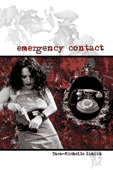Emergency Contact

If there is a politic of poetry at stake in Emergency Contact, it stems as much from the a politicized urban landscape, as it does from the poetic representation of that setting. Against the familiar backdrop of a neighbourhood in the process of an irrevocable gentrification, Ziniuk records the objects, people and small hi-stories―perhaps otherwise unregistered―of Toronto’s west end neighbourhood Parkdale. This is not nostalgia for an idea of authenticity via poverty, but a poetic document that condemns both the past ―remembering “the holiday season when the notorious…landlords” abandoned “31 floors of families without heat or electricity for almost a week”―and the future, symbolized by the novelty shop that sells “$30 felt-letter shirts claiming “Parkdale is for Lovers.” Without an acceptable past or future, Ziniuk carves out a space in the present to search for something “more long-term than Emergency,” something that is markedly aware of the problems of contingent plans and temporary solutions (“I live my life in increments./ Trish says we should stop that.”)
Collected into four parts, this is poetry to be reckoned with. It tackles political themes like poverty, gentrification, mental illness, gender and substance abuse through a ferociously poetic vision that handles themes of love, loss and identity with as much conviction. Participating in those age-old questions about the social and political obligations of poetry, Ziniuk reminds us that “people who decide their politics are also, usually also/ the ones to leave them,” and that “anarchy is not inherently against love.”
This is poetry as the expression of a personal politics that won’t allow itself the complacency of obvious definitions yet still grants us “our distinct ability to identify one another.” The question Ziniuk seems to ask is “based on what?” The politics presented in this collection resist the facility of either/or definitions and refuse a homogeneous signification of identity even (and especially) if identity politics is central.
Idealism ends fast. I am peeling stickers that say 'Feminists Fuck Better' and 'Violence Against Women, No Excuse' off my coffee table. Not that I don’t still believe it, I just don’t need the stickers anymore.
This reluctance to buy into the rhetoric of stickers, trademarked revolutions and marketing ploys rather than the substance of a political position has particular importance at the local sex worker drop-in centre, where Jane Doe is “not here simply for the good of/ the hookers.” Rather she is a “confident, capital ‘F’ feminist, card-carrying” utterly different from the girls living “outside the system without/a card to say they’ve politics, or a joke to explain/ themselves with” and utterly foreign to the poet and politics defined by Emergency Contact.